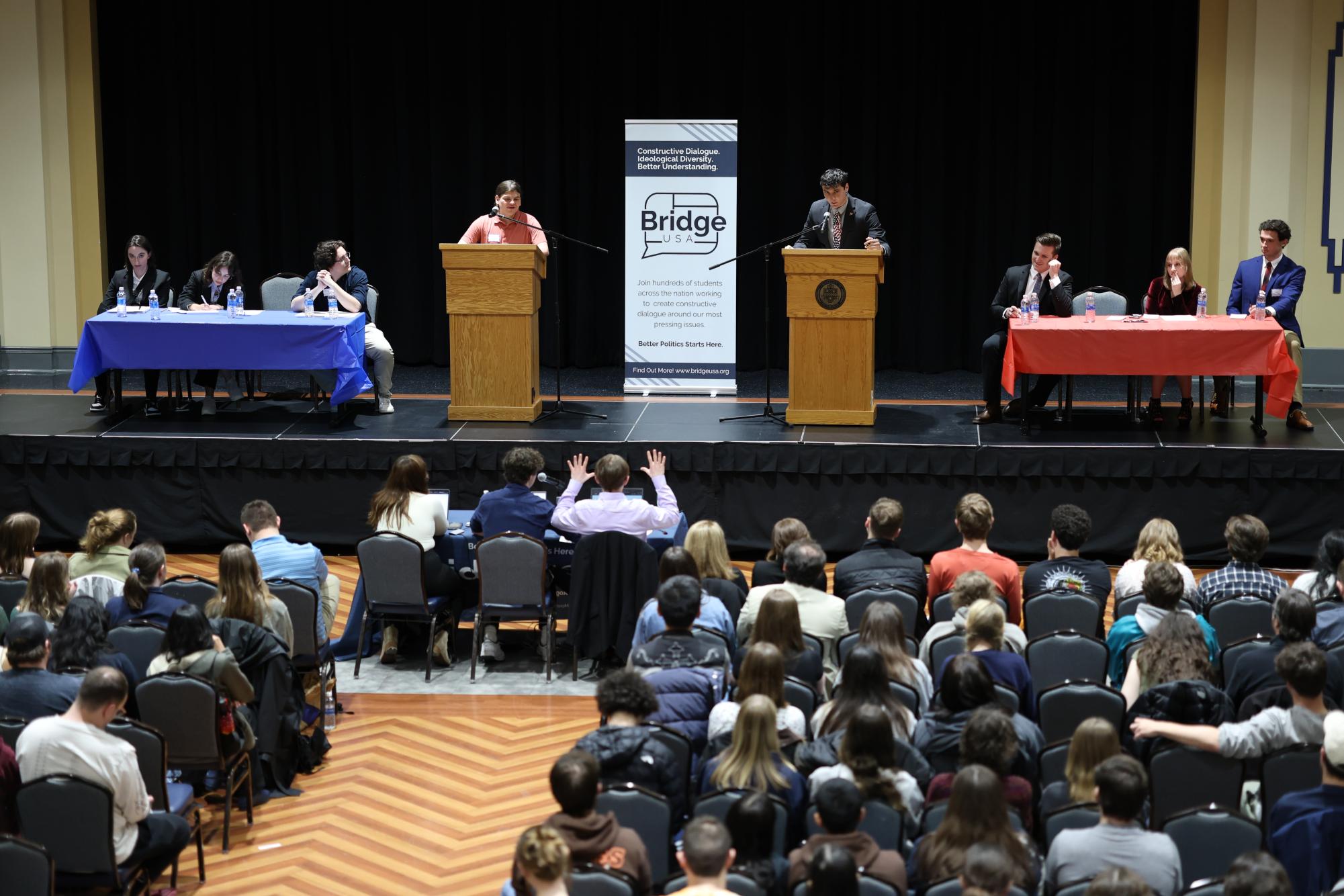Bridge Pittsburgh hosts second annual debate between Pitt College Democrats, Republicans


Henry Cohen, from College Democrats at Pitt, and Josh Minsky, from College Republicans at Pitt, debate a range of political topics at an event hosted by Bridge Pittsburgh on Tuesday night in the William Pitt Union Assembly Room.
Bridge Pittsburgh, a nonpartisan political club that is dedicated to “changing the way we approach disagreement,” hoped to bring people with different beliefs together during their second annual debate.
“One of our strongest held beliefs as an organization is that discussion is a necessary aspect of any civil and productive society; sharing ideas and discussing with one another in a rational manner is the key to finding good policy solution and to help us understand one another,” Alex Weaver, a political science major and vice president of Bridge Pittsburgh, said.
About 250 people gathered in the William Pitt Union Assembly Room for the second annual Pitt College Democrats versus College Republicans debate on Tuesday evening. The debate, which was hosted and moderated by Bridge Pittsburgh, opened with a conversation about foreign policy. The debaters also discussed the economy, diversity and inclusion and election integrity. There were four debaters from each side who chose a topic.
President of College Democrats Will Allison debated President of College Republicans Dylan Mitchell about the economy. Democrat Henry Cohen and Republican Josh Minksy debated foreign policy. Democrat Sam Podnar and Republican Jimmy Leggett debated diversity and affirmative action. Democrat Olivia Pinocci-Wrightsman and Republican Heather Wright debated election integrity and voter accessibility.
Jeremiah Cutright, an environmental studies major and president of Bridge Pittsburgh, said the current amount of political polarization “helps nobody.”
“It has led to a society where nobody can safely share their true opinions, resulting in none of us really knowing what even our close friends actually think because we are so scared of each other,” Cutright said. “Polarization is fundamentally destroying our ability to simply talk to and hear from one another. Without this basic tenet, everything else collapses.”
When discussing the economy, Allison said he is a “big fan” of Biden’s economic policy — also known as “Bidenomics.”
“We wholeheartedly believe that the administration has carried through the principles laid out,” Allison said. “There are about 50 or 60 examples, but I’m just gonna go through a classic one, which is the infrastructure bill. This was a Democrat plan, and it is the first significant investment in American infrastructure in decades.”
Mitchell feels that Biden is not doing a good job of mitigating inflation.
“Biden touts that inflation is down to only 3 1/2-4%,” Mitchell said. “A few years ago, 3 1/2-4% inflation would have been ridiculously high, but he’s comparing it to the 9 1/2% that he allowed it to get up to just a couple of years ago, and prices are not coming down. People can’t afford things — the average family can’t afford what they used to. It’s artificially boosting the GDP and making it look like the economy’s been propped up. But we have a record [$1.13] trillion in credit card debt that we’ve never had in this country before.”
One audience member thought the debate went differently than last year.
“The Democrats were a lot more confident than I had seen them, which was nice to see,” she said. “The Republicans made some points that I didn’t understand the truth behind and I was sort of confused at where they came from.”
Weaver feels that combating political polarization can help contribute to a more informed population of voters.
“By overcoming this polarization in attempting to have dialogue and discussion with one another, we can help rationally change minds for the better, and make significant progress in overcoming these obstacles by helping educate people on issues that make them smarter voters,” Weaver said
Cutright said hearing new opinions is a valuable part of higher education and is something the event wanted to encourage.
“Without learning new things and hearing new perspectives, we cannot grow,” Cutright said. “This is what higher education used to be about. It was about going somewhere your thoughts and opinions would be challenged, ruthlessly. This is how to make great thinkers, great institutions and great societies — the strongest steel is forged in the hottest fires. Without this challenge, intellectual progress stagnates and falls apart.”
Recent Posts
Therese Pitman: Giving back to Pitt’s student-athletes with equality
Pitman is Pitt’s Director of Student Athlete Development where she helps student-athletes navigate their career…
Pitt speech and debate team heads to nationals
The William Pitt Debating Union, Pitt’s speech and debate team, sends students to both in-person…
Visuals: A Year in Review
The visuals desk had an interesting year. In the midst of the 2024 Presidential Election,…
De-stress events across campus offer students a break from studying
During finals week, departments across campus are offering wellness events to help students manage stress…
Pitt students share their summer plans
After a long and strenuous academic year, many students are excited to take a break.…
Column | Collaboration and connection make us better — yes, even in journalism
Today is the last day I will ever do this, and despite the amount of…

